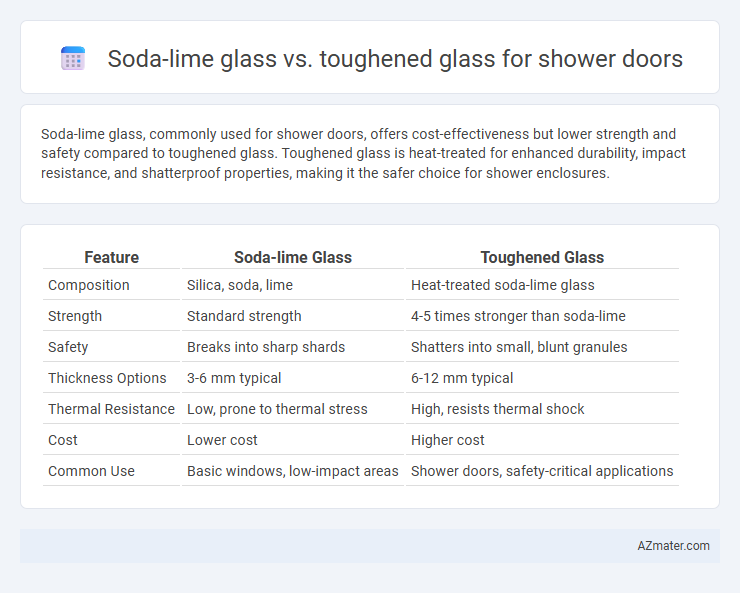Soda-lime glass, commonly used for shower doors, offers cost-effectiveness but lower strength and safety compared to toughened glass. Toughened glass is heat-treated for enhanced durability, impact resistance, and shatterproof properties, making it the safer choice for shower enclosures.
Table of Comparison
| Feature | Soda-lime Glass | Toughened Glass |
|---|---|---|
| Composition | Silica, soda, lime | Heat-treated soda-lime glass |
| Strength | Standard strength | 4-5 times stronger than soda-lime |
| Safety | Breaks into sharp shards | Shatters into small, blunt granules |
| Thickness Options | 3-6 mm typical | 6-12 mm typical |
| Thermal Resistance | Low, prone to thermal stress | High, resists thermal shock |
| Cost | Lower cost | Higher cost |
| Common Use | Basic windows, low-impact areas | Shower doors, safety-critical applications |
Introduction to Shower Door Glass Types
Soda-lime glass is the most common and cost-effective type for shower doors, offering clear visibility and basic durability. Toughened glass, also known as tempered glass, undergoes a heat treatment process to increase strength and safety, making it resistant to shattering into sharp pieces. Choosing between soda-lime and toughened glass impacts safety standards, longevity, and maintenance requirements for shower enclosures.
What is Soda-Lime Glass?
Soda-lime glass, the most common type of glass used in shower doors, consists primarily of silica, soda ash, and lime, offering affordability and ease of fabrication. While it provides clear visibility and basic durability for standard shower enclosures, it lacks the enhanced strength and safety features found in toughened glass. Toughened glass undergoes a heat treatment process, increasing its strength up to five times compared to soda-lime glass, making it a safer and more impact-resistant option for shower doors.
What is Toughened Glass?
Toughened glass, also known as tempered glass, is a type of safety glass processed by controlled thermal or chemical treatments to increase its strength compared to standard soda-lime glass. It is designed to shatter into small, blunt pieces rather than sharp shards, enhancing safety in high-impact environments like shower doors. Toughened glass is widely preferred in bathrooms for its durability, resistance to thermal stress, and compliance with safety standards.
Strength and Durability Comparison
Toughened glass offers significantly higher strength and durability compared to soda-lime glass, as it undergoes a thermal tempering process that enhances its resistance to impact and thermal stress. Soda-lime glass, commonly used in standard shower doors, is more prone to breakage and shattering under high pressure or sudden temperature changes. For safety and longevity, toughened glass is preferred in shower doors due to its ability to withstand daily use and accidental impact without compromising structural integrity.
Safety Features of Each Glass Type
Soda-lime glass, commonly used in standard shower doors, is prone to shattering into sharp, dangerous shards upon impact, posing a significant safety risk. Toughened glass, also known as tempered glass, undergoes a heat treatment process that increases its strength and causes it to break into small, blunt pellets rather than sharp fragments, greatly reducing injury hazards. The enhanced safety features of toughened glass make it the preferred choice for shower doors in both residential and commercial settings.
Cost Differences Between Soda-Lime and Toughened Glass
Soda-lime glass is significantly less expensive than toughened glass, making it a cost-effective choice for shower doors. Toughened glass undergoes a heat treatment process that increases strength and safety, resulting in higher manufacturing costs and a price premium of up to 50% compared to soda-lime glass. Despite the higher initial investment, toughened glass offers better durability and resistance to impact, potentially reducing long-term replacement expenses.
Aesthetic Options and Customization
Soda-lime glass offers versatile aesthetic options with its clear, frosted, and tinted finishes, allowing for personalized visual effects suitable for various bathroom styles. Toughened glass enhances customization through patterns, textures, and colors while providing superior strength and safety features essential for shower doors. Both glass types support tailored designs, but toughened glass delivers improved durability without compromising the aesthetic flexibility required in contemporary bathroom decor.
Maintenance and Cleaning Considerations
Soda-lime glass for shower doors requires regular cleaning with non-abrasive, mild detergents to prevent soap scum and mineral buildup, as it is more prone to scratches and etching. Toughened glass offers enhanced durability and resistance to impact, making it easier to maintain with routine cleaning using standard glass cleaners without worrying about damage. Both materials benefit from squeegeeing after use to minimize water spots and extend the clarity and lifespan of the shower door.
Environmental Impact and Sustainability
Soda-lime glass, the most common glass type for shower doors, has a lower environmental impact due to its widespread recyclability and lower energy consumption in manufacturing compared to toughened glass. Toughened glass requires an additional heating and rapid cooling process, increasing its carbon footprint and energy usage, but it offers enhanced durability that can extend the lifespan of shower doors, potentially reducing waste over time. Choosing soda-lime glass with eco-friendly coatings or recycled content supports sustainability efforts more directly, while toughened glass contributes to sustainability through long-term product resilience.
Which Glass is Best for Your Shower Door?
Soda-lime glass, commonly used for shower doors, offers affordability and ease of installation but lacks the impact resistance of toughened glass, making it less safe in high-use environments. Toughened glass undergoes a heat treatment process that enhances its strength and shatters into small, blunt pieces rather than sharp shards, providing superior safety and durability for shower enclosures. For long-term durability and maximum safety, toughened glass is the best choice for a shower door, especially in households with children or frequent users.

Infographic: Soda-lime glass vs Toughened glass for Shower door
 azmater.com
azmater.com